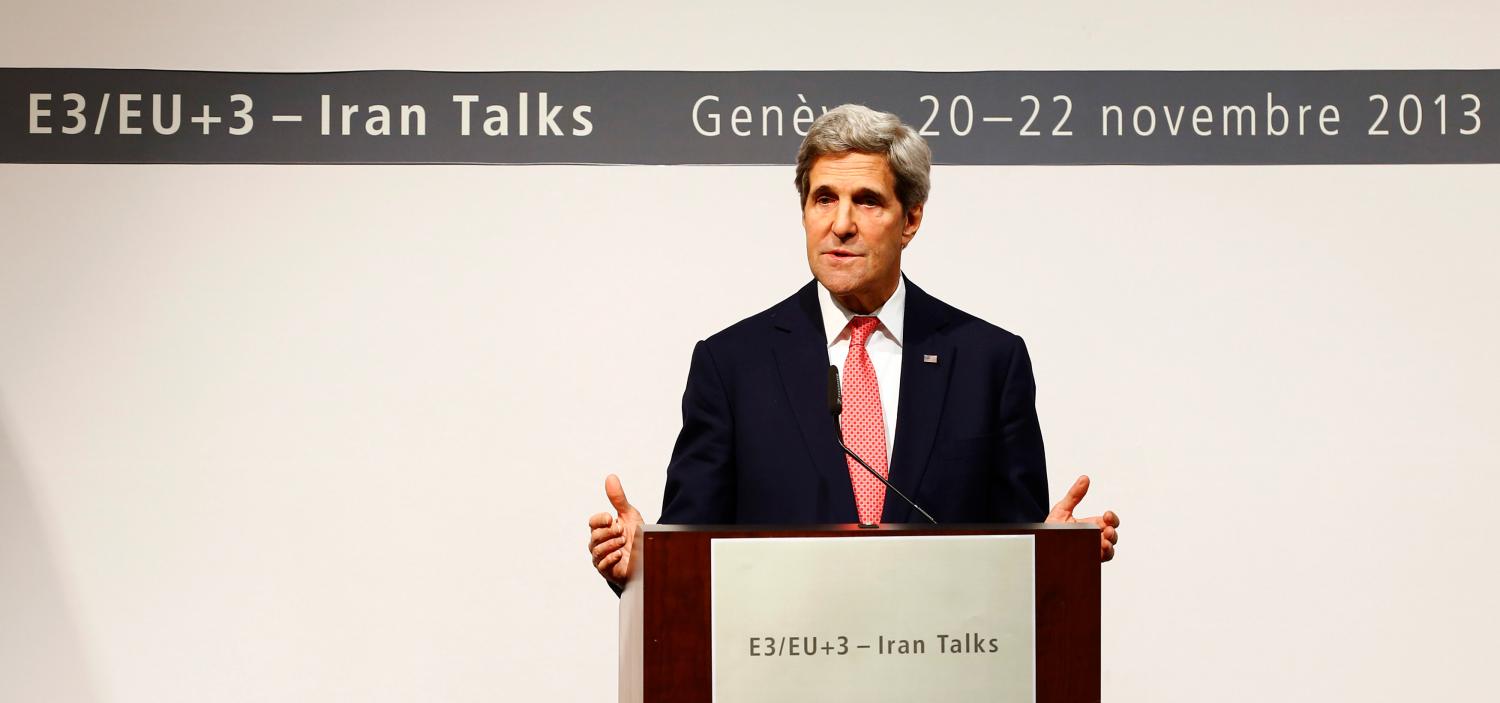Suzanne Maloney urges President Obama to pursue a comprehensive agreement with Iran that not only rolls back its nuclear program, but seeks to induce the Iranian government to adopt more responsible policies toward its citizens and neighbors. The prospective payoff—a world released from the perennial nightmare of an Iranian nuclear bomb—justifies the investment.
 |
MEMORANDUM TO: President Obama |
Summary and Recommendations
Your strategy on Iran has helped to create a historic opening with one of America’s most persistent and formidable adversaries. The strength of the sanctions regime and the breadth of international cooperation on Iran have generated an unprecedented opportunity to contain and curtail the Islamic Republic’s most dangerous policies. The interim agreement concluded in November accomplished the first tangible progress in nearly a decade toward thwarting the prospect of an Iranian nuclear weapons capability. However, this initial deal represents only the first step of an even more ambitious objective: a comprehensive agreement that rolls back Iran’s nuclear program; and a broader initiative to induce the Iranian government to adopt more responsible policies toward its citizens and neighbors.
Those efforts will prove even more complicated and more contentious among U.S. allies than the interim agreement, and they offer no certainty of success. Still, the dramatic reconfiguration of Iran’s nuclear diplomacy since Iran’s presidential election last June and the unprecedented traction in persuading Tehran to change its most worrisome policies justifies a double-down on our
investment in engaging Tehran.
I recommend the following measures as the starting point for an expanded diplomatic initiative with Iran: build on the interim deal to move quickly and decisively toward a comprehensive agreement on the nuclear issue; formalize a broader dialogue with Tehran that begins to tackle the wider array of U.S. concerns; and establish a dedicated special envoy to manage the U.S. policy toward Iran, focused not just on our dialogue with Tehran but on ensuring that the interests and anxieties of U.S. allies and regional partners are addressed.
Background
Iran’s politics broke wide open last summer with the unexpected election of a moderate new president, Hassan Rouhani. A decade earlier, Rouhani was responsible for brokering the sole significant compromise that Tehran had ever implemented on its nuclear activities—a 2003 suspension of uranium enrichment and reprocessing that lasted nearly two years. That made Rouhani the target of intense criticism from Iranian hard-liners, including Supreme Leader Ayatollah Ali Khamenei, during the eight-year presidency of Mahmoud Ahmadinejad.
Rouhani’s sudden rehabilitation and ascension to the theocracy’s second highest office reflected a consensus that had quietly expanded over the course of Ahmadinejad’s final tumultuous years: Tehran could no longer afford to maintain its collision course with the international community over the nuclear issue. The campaign that won Rouhani the presidency and his early rhetoric and actions once he took office in August confirmed that he has been given an explicit mandate to resolve the impasse and return Iran to a more normal place in the international economy and the community of nations.
The dual-track policy framework established in your first term and implemented with impressive multilateral coordination had a great deal to do with Iran’s change, but the shift in Iran’s domestic political dynamics owes much to internal considerations that are largely distinct from the sanctions and international isolation. Frictions within Iran over Ahmadinejad’s heterodox and destabilizing policies helped bind the regime’s establishment together in an almost unprecedented fashion.
As a result, Rouhani leads what should be understood as a national unity government. Despite the persistence of Iran’s factional competition and ideologically-driven critiques of the president’s policies, he has far greater authority and room for maneuver than any of his predecessors to undertake ambitious and innovative policies.
That is the most important factor that distinguishes this historical moment from all prior periods of optimism in the tortured U.S.-Iranian dynamic. Rouhani should be able to deliver on the most significant and sensitive aspects of international concern about Iran’s policies. The Supreme Leader continues to articulate a deeply engrained suspicion of American motives, but nothing that Rouhani has accomplished to date would have been possible without Khamenei’s explicit endorsement.
So we face an opportunity for diplomacy, one that is almost certain to dissipate if we do not make the most of it. Iranian politics remain at an unsteady equilibrium, and the internal balance of power could shift without warning. Each of Rouhani’s predecessors has seen his influence eroded over time, and powerful pockets of opposition to the changes underway in Iran’s relationship with the world remain. As a result, it is important that we move rapidly to make progress on our core concerns. To the extent that diplomatic progress on the nuclear issue also benefits Iran and its citizens, Rouhani’s more moderate position at home will be enhanced.
There are additional reasons for Iran to remain a principal foreign policy priority for the remainder of your second term: the interim deal has elicited significant pushback at home and among our allies. Their motivations vary. Some on Capitol Hill seek to use this issue for partisan advantage, but any opportunism is bolstered by the genuine unease of our closest allies in the region, including Israel and Saudi Arabia, over the staging of the negotiations, the terms that may be incorporated in a comprehensive nuclear deal with Iran, and the U.S. role in the region following a final deal.
For this reason, we must seek to build on the achievements of the interim nuclear agreement and fashion a comprehensive accord that establishes a framework of significant constraints and far-reaching inspection and verification on all aspects of Iran’s nuclear program. At the same time, we should broaden and formalize our dialogue with Iran beyond the nuclear issue, incorporating the wider array of U.S. interests and objectives, in particular the interrelated issues of terrorism, the peace process, Syria and human rights.
The process of achieving the incipient agreement on halting the advance of Iran’s nuclear program, and the responses it has evoked, offer some hints at how difficult it will be to accomplish these goals. It hardly needs to be stated that embarking on a wider-ranging negotiation with Tehran will compound this challenge exponentially.
However, creating a mechanism for dialogue on questions beyond the nuclear issue will also help us to insulate any progress toward a comprehensive nuclear accord from the rising chorus of demands articulated by U.S. allies. At the same time, it will provide crucial reassurance to these same allies, by demonstrating that Washington is not prepared to disregard or bargain away our longstanding objections toward Tehran’s policies in Syria, its support for terrorism and its repressive domestic policies.
As part of our diplomacy toward Tehran, we have an enormous amount of work to do to coordinate with and reassure our regional allies in Israel and the Arab world. They harbor deep trepidations about Iranian policies, but they are even more profoundly unnerved by the possibility of a shift in the formula of regional alignments. As a result, the instinctive preference for stability that characterizes our Gulf allies and the alarm that Israelis feel at the prospect of any bargaining with their existential adversary are manifesting already. They will only become more vociferous and potentially more obstructionist as any diplomacy proceeds.
These anxieties are not insurmountable; despite the consternation already expressed, a binding agreement that firmly constrains Iran’s nuclear ambitions would safeguard the region and the world from the devastating implications of an Iranian nuclear capability, as well as save the United States and its allies from the catastrophic costs of a military strike against the program. It would end the cyclical proclivity for brinksmanship on all sides that inevitably spooks the oil markets and threatens the global economic recovery. Moreover, a credible nuclear bargain with Iran would bolster the tattered non-proliferation regime by bringing a would-be rogue back from the brink of nuclear weapons status.
Still, it is difficult to imagine that this diplomacy can be pursued successfully without a dedicated special envoy. Secretary Kerry and Under Secretary Sherman have engaged with tremendous skill and success in pushing forward an impressive start to the process, but we have already paid a price in terms of interrupted momentum as a result of insufficient consultation with our P5+1 partners and with Congress. The initiation of real bilateral diplomacy with Iran is a historic opportunity. It cannot be a part-time endeavor to be balanced with a range of other issues and regional crises. To make the most of this propitious moment, we need a presidential envoy with a clear imprimatur from you to undertake the hard work that will be required.
Conclusion
There are, of course, no guarantees. Iran’s Islamic Republic is a persistently unpredictable state, and the animosity and distrust toward Washington runs deep among its relevant decision-makers. The sanctions have weakened Iran’s economy and helped persuade its leadership to take a chance on negotiations, but there are no guarantees that Tehran will be capable of making the critical compromises on the nuclear program required to achieve a final deal. Moreover, the spiraling civil war in Syria and the determination of Iran’s hard-liners to flex their muscles in hopes of regaining domestic primacy may undermine diplomacy, and could still instigate a confrontation that neither side desires.
Still, the alternatives to a negotiated deal remain profoundly less attractive than the risks involved in pursuing one. The evidence of the past six months of Iran’s newfound readiness to deal and the prospective payoff—a world released from the perennial nightmare of an Iranian nuclear bomb—is more than sufficient to justify the investment of your time and energy on this issue. And if Tehran proves unwilling to cross the finish line, you will have demonstrated American commitment to diplomacy and reinforced the global coalition committed to preventing Iran from achieving nuclear weapons status.
Read last year’s corresponding Big Bets and Black Swans memo, “Turning Tehran” by Suzanne Maloney »
The Brookings Institution is committed to quality, independence, and impact.
We are supported by a diverse array of funders. In line with our values and policies, each Brookings publication represents the sole views of its author(s).




